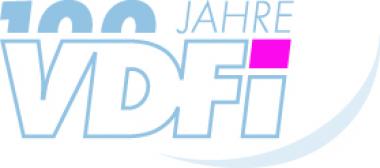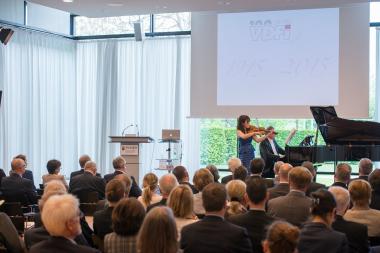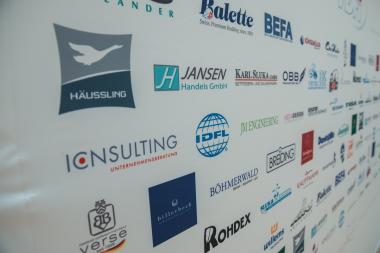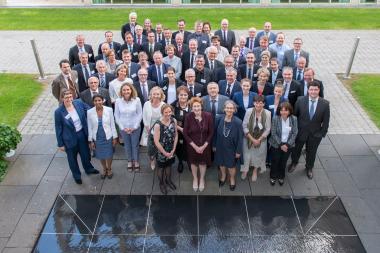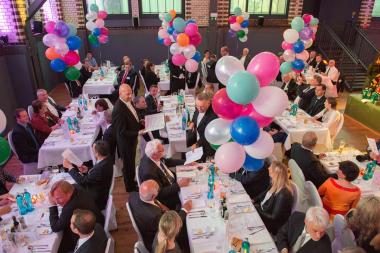COVID-19: German Down and Feather Industry exemplary in Terms of Hygiene
- Update on the economic situation of the industry
- Supply availability secured for the next half-year
- E-commerce wins in the crisis
- Sector survey of the Association of the German Down and Feather Industry VDFI and Traumpass e.V. on the occasion of the Corona crisis
The corona pandemic not only poses great challenges for each and every one of us, but also for our businesses as an industry. The decisions of the Federal Government and the federal states to close down shops and restrict freedom of mobility have hit the predominantly medium-sized down and feather industry hard, not only on the sales side, but also through their trading partners. The declining demand was compounded by the industry's international dependencies within the supply chains, since the filling material, the covers and the packaging materials are largely imported. The closure of the borders within Europe and the overall tense global logistics situation contributed significantly to the worsening of the situation.
In the past few days, the federal and state governments have started cautious attempts to ease the contact bans and to revive the economy with a sense of proportion. The opening of shops and the continuation of business activities prompted the down and feather associations to question the status quo of the sector with an extensive survey.
Although the companies named significant losses in their turnover, they currently still got off relatively lightly compared with other sectors. Two thirds of the companies stated that they had suffered up to 25% sales losses due to the corona crisis. Approximately 17% reported a decline of up to 50%, the ones with same percentage were much harder hit with a decline of up to 75%.
On the occasion of Heimtextil in January 2020, the association's sector statement had described the position of the specialised trade as still stable from the bedding manufacturers' point of view: By expanding the range of services, such as cleaning down and feathers or refilling existing bedding, the local store was increasingly becoming a point of contact for consumers. Supporting the advisory competence and the deployment of sleep experts made an impact. This picture has changed significantly as a result of the contact ban:
The clear loser in terms of demand on the various sales channels, caused by the shop closures, was the traditional retail: 92% of the surveyed manufacturing companies registered declining demand for the retail trade, 90% for the furniture trade and 80% for the specialty stores. Even for the discounters, whose opening hours were not affected, 33% noted a drop in demand; 44% estimated the demand situation as unchanged. The winner in the crisis was the e-commerce, although perhaps to a lesser extent than expected: 45% of the German down and feather producers recorded an increase in demand, 36% estimated the level as unchanged.
In terms of supply capability, the industry in Germany considers itself as well positioned: Two thirds see no bottlenecks for the fulfilment of closed contracts within the next three months, and the majority also offers free capacities beyond that. And 55% guarantee this ability to deliver even for the next six months, including the satisfaction of additional requirements.
While 2019 was a year of consolidation for the German down and feather sector and, after difficult months with sharply increased raw material prices, a calming down on a high level prevailed, good results from the previous year were maintained and, in some cases, even increased, the assessment for 2020 is much more pessimistic.
As far as the price situation for the coming autumn/winter season is concerned, member companies were correspondingly cautious in their forecasts.
The unresolved and in some cases very fragile situation in the supplier countries currently not allows to make reliable statements. At the earliest in late summer, a well-founded opinion can be obtained. Especially since 45% of the companies expect to be confronted with requests for price reductions.
The down and feather industry is a professional when it comes to hygiene. The highest purity requirements are placed on down and feathers: Before being used as filling material, they must be cleaned by thorough water washing and dried at a temperature of at least 100°C, usually higher. This ensures that bedding meets the hygiene requirements of European Standard EN 12935 with reliably killing bacteria, viruses and other germs. In addition to the applicable standards, the companies have taken additional precautions to protect employees, trade partners and consumers.
In addition to the intensive workplace and hand disinfection, which all manufacturers have increased, the companies focused particularly on the equalization of the workforce. 73% designed home office workplaces for employees outside production, 45% introduced strict shift separation, two thirds shifted working hours and changed the use of common rooms in order to have as few employees as possible in the company at the same time and thus minimized the risk of infection. At the same time, many companies started the production of mouth and nose masks and made their sewing facilities available for this purpose. A list of the manufacturing companies is available from the Association of the German Down and Feather Industry VDFI e.V.
With the start of the lockdown, the German government had announced extensive financial aid, which focused on bridging payments for small businesses, granting loans, short-time work and tax deferrals. Improvements had to be made for small and medium-sized enterprises. In the recent weeks, the sector has not primarily addressed the question for bridging loans nor reducing the interest burden; emergency aid in the form of financial injections and non-repayable grants was also of interest only to one third. The majority of the association members concentrated on measures to secure liquidity (45%), tax deferrals and the suspension of advance payments of VAT (73%) as well as the changeover to short-time work (73%) and the accelerated processing and granting of short-time work compensation (45%). Also, two thirds requested binding statements on the easing of the contact ban and on the economic upturn.
An update on the industry survey is planned for late summer 2020.
VDFI e.V. / Traumpass e.V.



